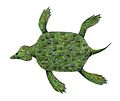Picrocleidus
| Picrocleidus Temporal range: Middle Jurassic,
| |
|---|---|

| |
| Fossils from both specimens of P. beloclis | |
| Scientific classification | |
| Domain: | Eukaryota |
| Kingdom: | Animalia |
| Phylum: | Chordata |
| Class: | Reptilia |
| Superorder: | †Sauropterygia |
| Order: | †Plesiosauria |
| Family: | †Cryptoclididae |
| Genus: | †Picrocleidus Andrews, 1910 |
| Type species | |
| †Muraenosaurus beloclis Seeley, 1892
| |
Picrocleidus is an extinct genus of plesiosaur from the Middle Jurassic Oxford Clay Formation (Callovian stage) of the United Kingdom.
Discovery and naming
[edit]
The holotype was discovered in the Oxford Clay Formation in Peterborough, England and acquired by Alfred Nicholson Leeds.[1][2] It was initially assigned to Muraenosaurus as M. beloclis by Seeley in 1892.[3] The specific name means "arrow clavicle", referring to the triangular interclavicula. M. beloclis was moved to its own genus Picrocleidus by Charles William Andrews in 1910.[2][4] The generic name is derived from Greek pikros, "sharp", en kleis, "key", again referring to the clavicles.
Five specimens are known:
The holotype specimen BMNH R1965, a postcranial skeleton.
Specimen BMNH R3698, a skeleton with skull, including a complete tail.
Specimen BMNH R2429, an old individual consisting of anterior and posterior cervical vertebrae, pectorals and the first dorsal, some dorsal ribs, the shoulder-girdle, and the left humerus.[2]
Specimen BMNH R2739, consisting of a basisphenoid and parasphenoid, cervical vertebrae, sacrals with the sacral ribs, an anterior caudal, some ventral ribs, both radii, odd paddle-bones, portions of ilia, ischia, and pubes.[1]
Specimen HM 2981666: a young individual.
Classification
[edit]Picrocleidus has previously been considered synonymous with Muraenosaurus although there are doubts in the relationship between the two groupings.[5]
Picrocleidus is currently classified as a member of the Cryptoclididae.[4]
See also
[edit]References
[edit]- ^ a b Benson, R. B. J.; Druckenmiller, P. S. (2013). "Faunal turnover of marine tetrapods during the Jurassic-Cretaceous transition". Biological Reviews. 89 (1): 1–23. doi:10.1111/brv.12038. PMID 23581455. S2CID 19710180.
- ^ a b c Andrews, Charles W. (1910). A descriptive catalogue of the marine reptiles of the Oxford Clay, Part 2. British Museum (Nat. Soc.) 13:139-149.
- ^ Seeley, Harry G. (1892). "The nature of the shoulder girdle and clavicular arch in sauropterygia". Proceedings of the Royal Society of London. 51 (308–314): 119–151. doi:10.1098/rspl.1892.0017. ISSN 0370-1662.
- ^ a b Muraenosaurus? Reedii, Sp. Nov. and Tricleidus? Laramiensis Knight, American Jurassic Plesiosaurs. The Journal of Geology, 20, 4, 344-352.
- ^ Wilhelm BC. (2010). A New Partial Skeleton of a Cryptocleidoid Plesiosaur from the Upper Jurassic Sundance Formation of Wyoming. Journal of Vertebrate Paleontology , 30, 6, 1736-1742.







